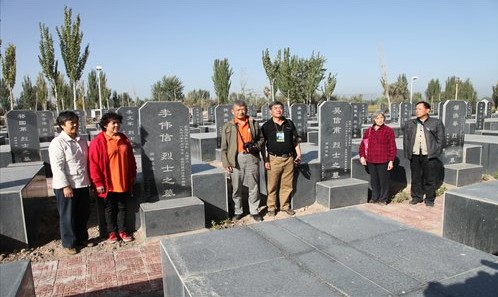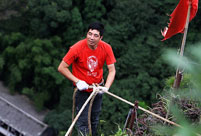 |
| Shanghai zhiqing visiting the graves of former comrades who died in Xinjiang during the Cultural Revolution (1966-76) Photo: Courtesy of Yang Yongqing |
On the morning of September 7 this year, 262 Shanghai middle-aged and older men and women boarded a train bound for the Xinjiang Uyghur Autonomous Region. The journey from the city to the far-flung province took them more than 60 hours. It was not the first time they had made this journey.
Some had first made this trip 50 years before in 1963. Most had traveled this route in the 1970s and for some the journey had then taken 28 days.
These men and women were some of the 100,000 Shanghai people who went to live and work in Xinjiang in the 1960s and 70s. They were the zhiqing ("the sent-down youth"), the 17 millions or so young people who went from their birthplace cities to spend years in far-flung counties and provinces.
Some of the zhiqing volunteered but most were coerced to join the "Up to the Mountains and Down to the Countryside Movement." From the 1960s to the end of the Cultural Revolution (1966-76) these teenagers became laborers in the countryside "undergoing re-education by poor peasants" as the then chairman Mao Zedong phrased it. Most left school when they were 16 but some were aged 14. Others were in their 20s and had some work experience - most of this group had volunteered.
After the Communist Party of China ended the rustication movement in October, 1980, tens of thousands of young people left the farms they had been working on to return home. For most of the people on the train last month this was the first time in more than 30 years they had visited the region where they had spent an influential part of their lives.
Natural beauty
They had two reasons for their visit: they would return to the farms and villages where they worked; and, for the first time, they would get to see some of the natural beauty of the region.
Most had never seen the parts of Xinjiang that have become famous as "must-see" tourist venues. For them, as they told the Global Times, Xinjiang was a workplace and their lives were restricted to the farms where they labored. Those were the days when everyone worked a six-day week, single people were given a 56-day paid leave every three years, and married people had a holiday once every 10 years. These holidays were always spent visiting Shanghai.
For the Shanghai visitors the 22-day trip - they spent 16 days in Xinjiang itself - was a dream come true. There is a Chinese saying that "it's a tragedy to go to Xinjiang and not set foot on Kashgar and Yili." For these travellers there's now no tragedy involved. As well as seeing Kashgar and Yili, they stopped over in the capital Urumqi.
It was not that they had never intended to return to Xinjiang. But for these retirees a return journey between Shanghai and Xinjiang in summer (most can only travel then because they look after grandchildren) was difficult to organize and costly - a single train ticket to Xinjiang costs at least 2,000 yuan ($327.20).
An offer from a Shanghai travel agent and assistance from the government helped make the September tour possible and affordable. The return journey, accommodation, and admission to some sightseeing venues set each traveler back less than 5,000 yuan.
The last of the Xinjiang zhiqing returned to Shanghai in August 2009. Sixty-something Jiang Wanfu is tall and softly spoken and for him the journey was the first time he had seen Xinjiang beyond the township of Yecheng, on the borders of India and Pakistan - even though he had been working there as a surgeon for 43 years.
"I had passed through eastern Xinjiang by train but that was all - so Turpan with its famous Flaming Mountain and Grape Valley were just the names of train stops. Everyone says Xinjiang is one of the great scenic areas but after 43 years of being a Xinjianger I was almost clueless about it. The trip there was wonderful - I fulfilled a lifelong wish," Jiang told the Global Times.
But for Jiang the strongest impression of the journey was seeing how underdeveloped Xinjiang was compared to the east coast. While farmers and farm workers are better off, and these days cotton and dates are being grown in the region which also has a prosperous mutton industry, Jiang found there had been only a slight improvement in living standards.
 |
 2013 Colour Me Rad 5K run held in Canada
2013 Colour Me Rad 5K run held in Canada China's destroyer Qingdao sails out of Sydney Harbor
China's destroyer Qingdao sails out of Sydney Harbor Chinese tycoon aims to restore London's Crystal Palace
Chinese tycoon aims to restore London's Crystal Palace Worst flooding hits Yuyao, 70% of downtown area underwater
Worst flooding hits Yuyao, 70% of downtown area underwater Game for the brave: 'Spiders' in Yandang Mountains
Game for the brave: 'Spiders' in Yandang Mountains Hungarian wingsuit flyer confirmed dead in Zhangjiajie
Hungarian wingsuit flyer confirmed dead in Zhangjiajie New couples take wedding photos during holiday
New couples take wedding photos during holiday Serena Williams stumbles through to quarterfinals
Serena Williams stumbles through to quarterfinals Thailand Mobile Expo 2013 kicks off
Thailand Mobile Expo 2013 kicks off Photo collection of Chinese Navy
Photo collection of Chinese Navy Photo story: Young tenants in Beijing
Photo story: Young tenants in Beijing Twins Culture Festival kicks off in Beijing
Twins Culture Festival kicks off in Beijing UNESCO world heritage site: Montale Tower
UNESCO world heritage site: Montale Tower Israeli drone crashes into Mediterranean, fragments recovered
Israeli drone crashes into Mediterranean, fragments recovered Serena Williams wins second China Open title
Serena Williams wins second China Open titleDay|Week|Month